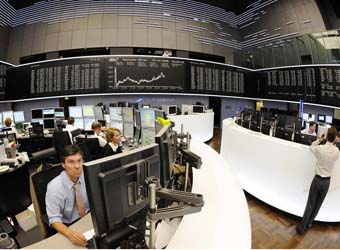The pan-European Stoxx 600 was 0.48 percent lower with most sectors moving into negative territory. Looking to bourses, the U.K.’s FTSE 100 was posting minor gains, while France’s CAC 40 and Germany’s DAX fell into the red.
Basic resources was Europe’s worst performing sector after disappointing data in China and a decline in metal prices brought down most of the stocks. Industrial production, retail sales and fixed asset investment numbers in the world’s second-largest economy missed expectations. Several London-listed miners fell to the bottom of the index, including Glencore, Rio Tinto and Anglo American.
Nonetheless, the main focus in Europe remained on earnings.
As a result, the telecoms sector was one of the biggest gainers with the U.K. telecoms giant Vodafone raising its full-year earnings growth to around 10 percent from 4-8 percent. The numbers sent the stock over 4.5 percent higher.
German telecommunication service provider Drillisch rose 2.6 percent after announcing its nine-month results.
Technology stocks were also higher after Simcorp reported third-quarter results above expectations. The stock rose over 8.5 percent on the news.
Tesco was up 6.3 percent after regulators approved its takeover of Booker. Henkel, a German chemical and consumer goods company, warned against difficult conditions in the consumer goods market during their third-quarter results. The stock fell 5 percent.
Utilities company RWE announced a 9.3 percent increase in its nine-month core earnings on Tuesday. The share price was down 4 percent.
In other corporate news, Credit Suisse agreed to pay $135 million to a New York regulator for misconduct in its foreign exchange business.
In terms of data, flash gross domestic product figures in Germany showed an expansion driven by exports and investments. GDP was up 0.8 percent in the third quarter from 0.6 percent in the previous quarter.
In the U.K., new inflation numbers came in lower-than-expected with consumer prices up 0.1 percent month-on-month and 3 percent year-on-year versus 0.2 and 3.1 percent expected, respectively. Sterling dropped on the data but recovered shortly afterwards.
Source: CNBC



